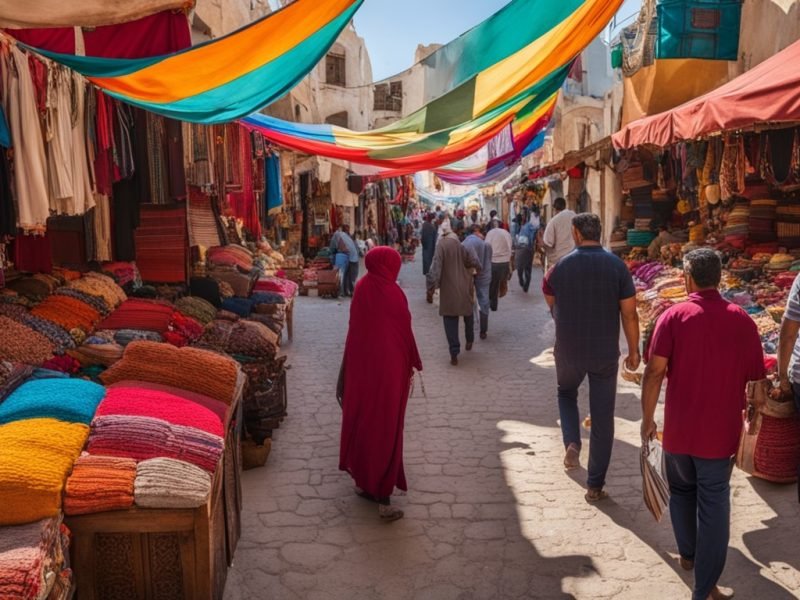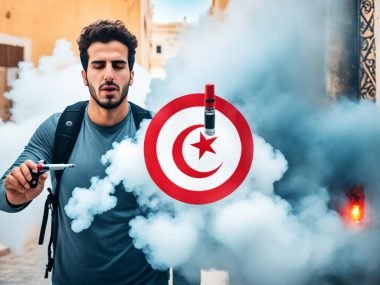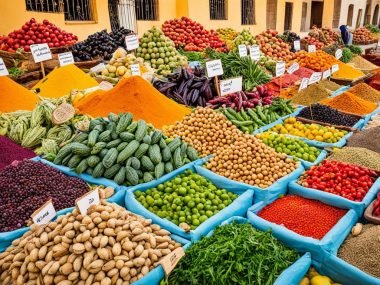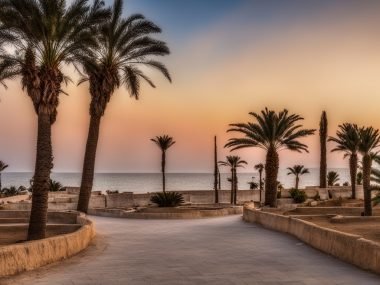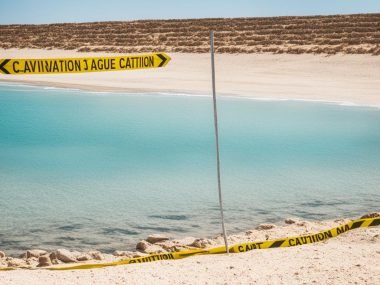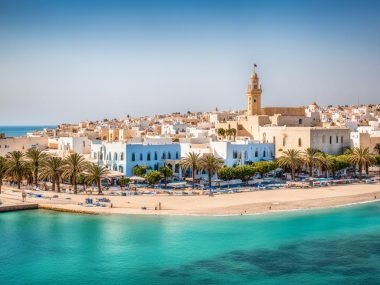Did you know Tunisia could be tough for LGBTQ+ travellers? Despite progress in other areas, same-sex relations can lead to jail. This fact is key for those thinking of visiting. Many wonder, “Is Tunisia Safe For Gay Tourists?” as they learn about Tunisia’s stance on LGBTQ rights.
There’s hardly any legal protection for LGBTQ people in Tunisia. Things like same-sex marriage, adopting kids, or laws against hate are not in place. The United States Department of State has noted cases where people were picked up by the police just for being themselves.
Gay tourists face several hurdles in Tunisia. Staying low-key in how you act and look can help avoid trouble. The laws and how people think mean you must be careful during your visit.
Key Takeaways:
- Same-sex relations in Tunisia are illegal, with penalties of up to three years of imprisonment.
- LGBTQ rights, such as anti-discrimination protections and recognition of same-sex unions, are non-existent in Tunisia.
- Authorities may detain and question individuals based on their sexual orientation and appearance.
- Discretion is advised for LGBTQ travellers to ensure safety.
- Understanding the local legal and social environment can help mitigate risks during travel.
An Overview of LGBTQ+ Rights in Tunisia
Let’s dive into the rights of LGBTQ+ people in Tunisia. This country has made progress, but it still faces many challenges. These challenges stem from its laws and how people think and act.
Legal Status
The laws for LGBTQ+ folks in Tunisia are tough. One law, Article 230, makes being gay a crime. It can land someone in jail for up to three years. This law has been around since 1913. It shows the legal issues LGBTQ+ people face in Tunisia.
There are also laws about public decency. These often target gay and transgender people. They can be forced into very personal and unfair exams. Many groups around the world have spoken out against these acts.
Social Challenges
Life can be hard for LGBTQ+ people in Tunisia because of how others treat them. They often face hate and harm from those around them. Sometimes, even their families turn them away.
People’s negative views make it hard for gay people to be themselves. This makes Tunisia a difficult place for LGBTQ+ travellers. If you’re planning a trip, it’s important to be careful and know what to expect.
There’s a big gap between the laws and how people are accepted. Knowing about this gap is key for anyone visiting Tunisia. It helps travellers stay safe and have a better trip.
LGBTQ+ Historical Context in Tunisia
Tunisia has a long history with LGBTQ+ issues. They’ve been complex for centuries. This history affects today’s challenges. In the 18th and 19th centuries, gay people in Tunisia had certain social roles. These were influenced by the larger Muslim community. Yet, stigma was still a big problem. It shaped how LGBTQ+ people lived back then.
Early History
Long ago, being LGBTQ+ in Tunisia put you in a special group. Gay folks had their own roles in society. This tried to include them in the bigger Muslim community. But, stigma and prejudice were still strong. This made life very hard for many.
Understanding Tunisia’s LGBTQ rights needs a look at old times. It was a mix of roles and stigma. The aim was to fit diverse identities together. But, true inclusion and acceptance were missing.
Post-Arab Spring Period
After the Arab Spring, things started to change. But, it wasn’t easy for the LGBTQ+ community. The government didn’t accept international advice to change laws on same-sex relationships. This sparked big debates about LGBTQ+ rights in Tunisia.
One time, a rights minister said being gay was a health issue. This comment caused a lot of international upset. It showed the deep legal and social problems in Tunisia.
We hoped things might get better for LGBTQ+ folks after the revolution. But, tough laws against LGBTQ+ people stayed. These laws got even stronger. They show the long struggle of LGBTQ+ rights in Tunisia.
Current Legal Risks for Gay Tourists
Travelling to Tunisia as an LGBTQ+ tourist has its challenges. You’ll find laws and social views that are not welcoming. This is mainly because of Tunisian laws against same-sex love. These laws are a big problem for both visitors and locals.
Sodomy Laws
In Tunisia, being in a same-sex relationship can lead to jail. The law, known as Article 230, can put someone in prison for up to three years for sodomy. It started in 1913, got updated in 1964, and is still a major issue today. Even though the law isn’t always enforced, the danger is always there. It can have serious effects on anyone caught.
Public Decency Laws
Tunisia’s public decency laws also target LGBTQ+ people. They’re not clear-cut, which means they’re open to different interpretations. Because of this, LGBTQ+ tourists risk getting arrested and facing harsh treatments. These actions are worrying and question privacy rights and human dignity.
If you plan to visit, following Tunisia travel safety advice is smart. Being careful in public places is key. Knowing the laws and staying discreet can help ensure a safer trip.
Social Acceptance and Local Attitudes
Thinking about LGBTQ+ travel Tunisia means facing its social complexity. This complexity greatly affects LGBTQ+ people. In a society where conservative views are common, LGBTQ+ folks often struggle. They find it hard to be accepted by family and community.
Family reactions can sometimes lead to being pushed away and even harm. This makes it very challenging for them to be accepted socially.
Family and Community Reactions
In Tunisia, people generally have conservative views. This affects families and communities a lot. LGBTQ+ individuals often face rejection and unkindness from those close to them. These harsh responses are not just emotional. They can also lead to violent behaviour, making it hard for LGBTQ+ people to feel accepted.
Public Spaces and Safety
Safety issues reach public places too, where LGBTQ+ people often feel unwelcome. They must be very careful and keep a low profile in public. Since the 2011 revolution, there has been some progress, but it’s fragile. Activists are fighting hard to change Tunisian local attitudes for the better. They want safer and more welcoming communities.
Some private groups and online communities are becoming more open. However, there’s still a long way to go for real change. Accepting LGBTQ+ people fully in society will take time and a lot of effort.
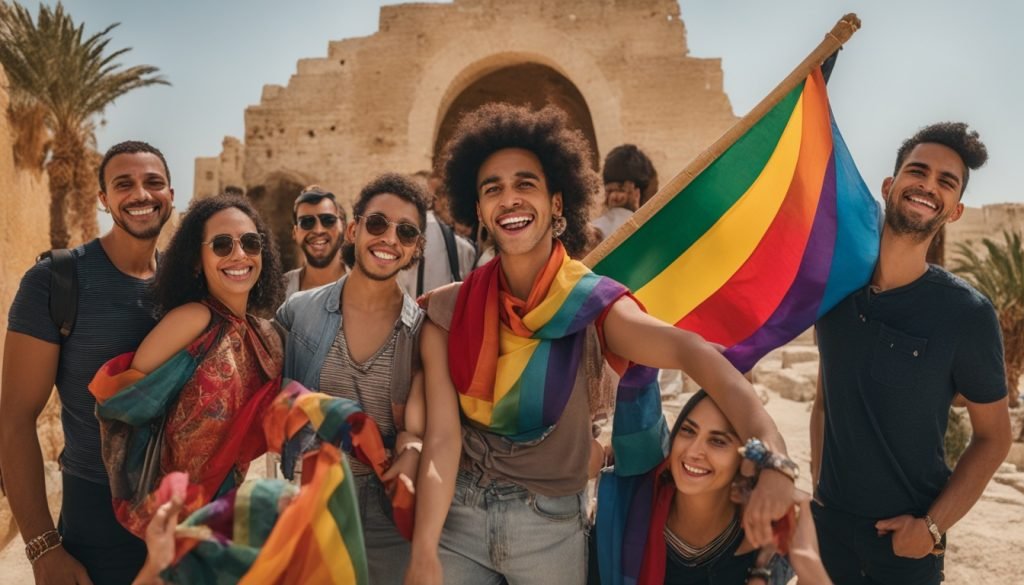
Organisations Supporting LGBTQ+ Rights in Tunisia
In Tunisia, groups are standing up for LGBTQ+ rights. They push for laws to change and offer help to the LGBTQ+ community.
Association Shams
Association Shams is a big name in Tunisia’s fight for LGBT rights. They have the government’s nod and lead the charge to make being gay okay by law. They work to make things safer for LGBTQ+ people and help everyone understand and accept them.
Mawjoudin
Mawjoudin also fights for LGBTQ rights in Tunisia. They do many things to lift LGBTQ+ culture and rights. They run the Mawjoudin Queer Film Festival every year. This festival shows LGBTQ+ creativity and brings people together.
Association Shams and Mawjoudin play key roles in helping the LGBTQ+ community. Their hard work helps make a better world, even when it’s tough.
LGBTQ+ Events and Cultural Activities
Tunisia is showing more queer culture and LGBTQ+ events nowadays. These activities create safe spaces and help make LGBTQ+ presence normal in the country.
Mawjoudin Queer Film Festival
The Mawjoudin Queer Film Festival is a key LGBTQ activism event in Tunisia. It offers a space for movies about queer life and LGBTQ+ people’s stories. The festival gets attention from around the world, bringing people together in support and friendship.
Online Presence and Activism
Digital platforms have really helped LGBTQ activism in Tunisia grow. Social media lets people gather support, spread the word, and challenge cultural and legal issues. It’s a safe space for those who can’t join in publicly, letting them connect and seek change. This shows how Tunisia’s queer community stays strong and hopeful, no matter what.
Tips for Safe Travel in Tunisia
I think staying safe is key when planning a trip to Tunisia. This is due to its unique culture and laws.
Accommodation Advice
Choosing where to stay is a top Tunisia travel safety tip. Pick places that welcome everyone. Look for hotels or guesthouses that support LGBTQ+ guests. Before you book, check what others say and ask if they support everyone. Stay in areas where lots of tourists go to be extra safe.
Public Behaviour and Caution
Knowing the local culture is very important for safe travel in Tunisia. Being too affectionate in public is not well-seen. Being low-key helps avoid trouble and respects local laws. Dressing simply and knowing local ways helps too. These steps make your trip better and safer.
Talking to local LGBTQ+ groups can also help, but be careful. They offer good LGBTQ travel advice Tunisia not found online. But, remember to be discreet due to the nature of LGBTQ+ issues there. They can be a great support while you remember to respect local customs.
Real Stories from LGBTQ+ Travellers
LGBTQ+ travellers in Tunisia face challenges because of strict laws. Their stories show what it’s like. They tell us about the ups and downs while travelling there. It’s important to be careful and aware in such places.

Being careful was key for one traveller. Tunisia has beautiful places and culture. But, they had to avoid talking about their sexual orientation to stay safe.
Another person shared worries about police checks. They thought the police looked at their papers more closely. They stressed knowing the local laws and acting respectfully.
A traveller talked about a good experience. They stayed at a place that was welcoming and quiet. They also met local LGBTQ+ groups. This helped them find safe spots to enjoy.
Here is what we can learn from these stories. This advice can help others who might visit Tunisia:
| Key Learnings | Details |
|---|---|
| Discretion in Public | Maintain a low profile to avoid unnecessary attention from authorities and locals. |
| Understanding Local Laws | Stay informed about Tunisia’s stringent laws against same-sex relations and public decency. |
| Inclusive Accommodation | Choose locations known for their discretion and support for LGBTQ+ guests. |
| Local LGBTQ+ Connections | Engage with local LGBTQ+ groups for insights on safe venues and events. |
These stories highlight the need to enjoy Tunisia’s culture carefully and with respect. It’s about finding a balance between exploring and staying safe.
Is Tunisia Safe For Gay Tourists?
Understanding if Tunisia is safe for gay tourists means looking closely at local laws and how the MENA region views LGBTQ+ rights. Tunisia is a bit of a mixed bag. It has some risks but also reasons to be hopeful.
Comparative Safety in the MENA Region
In the MENA region, Tunisia stands out a bit. After its revolution, it started to improve. But, acceptance of LGBTQ+ people is still not great. Lebanon and Jordan are more open compared to Tunisia. But, places like Saudi Arabia and Iran are much tougher.
Personal Safety Tips
Thinking about visiting Tunisia? Here are important safety tips:
- Discretion is Key: Keep your sexuality private in public places.
- Avoid Public Displays of Affection: This can draw bad attention or legal problems.
- Stay informed: Follow travel advisories and avoid dangerous areas.
- Engage with Local LGBTQ+ Groups Discreetly: Joining local support groups can help, but be careful.
Deciding if Tunisia is safe for gay tourists needs careful thought. You need to know the challenges and be ready for them.
The Role of Civil Society in Tunisia’s LGBT Movement
In Tunisia, civil society helps a lot with LGBT rights. They help change laws and support the LGBT community. This teamwork is key to fighting unfair laws and making everyone feel included.
Advocacy and Legal Reforms
Groups like Association Shams and Damj lead the way in Tunisian LGBT advocacy. They fight hard to change bad laws like Article 230, which is against same-sex love. They stand up and take legal action to break down barriers for LGBT people.
Community Support Initiatives
Besides fighting laws, these groups also help the LGBT community support Tunisia directly. They make safe places for LGBT people to meet and help them with mental health and legal advice. This work is very important for making strong civil society LGBT rights and bringing people together.
| Organisation | Key Activities |
|---|---|
| Association Shams |
|
| Damj |
|
Warnings Issued by Foreign Governments
Before you go to Tunisia, it’s key to check the latest travel warnings. These warnings are extra important for LGBTQ+ people. They help navigate laws and social views.
FCDO Travel Advisories
The FCDO in the UK keeps their travel tips updated. They point out risky areas in Tunisia. They also give advice on terrorism, places to avoid, and tips for LGBTQ+ visitors.
Keeping up with these tips helps in planning a safe trip to Tunisia. It helps understand the situation there too.
Insurance Considerations
Travel insurance is also key to think about. Make sure your insurance covers the risks the FCDO mentions. Not following the advisories could mean your insurance won’t cover you.
It’s very important to check Tunisia LGBTQ travel warnings. And make sure you’re fully covered for a worry-free journey.
| Advisory | Description |
|---|---|
| FCDO Regional Warnings | Includes areas with elevated terrorism or safety risks. |
| LGBTQ+ Specific Guidance | Provides guidelines on safe conduct and regions to avoid for LGBTQ+ travellers. |
| Travel Insurance Considerations | Emphasises the importance of adhering to advisories to ensure valid insurance claims. |
Conclusion
Tunisia is full of cultural joys and historic places. But, safety for LGBTQ+ travellers is complex. This is because of the laws and social attitudes. For gay tourists, it’s important to be careful and know about these challenges.
The laws in Tunisia are against same-sex relations and there is social pressure too. This makes it hard for LGBTQ+ visitors. They need to be careful about how they act and with whom they talk. It’s vital to know the laws well to avoid risks.
However, there’s hope as some groups are fighting for change. Organisations like Association Shams and Mawjoudin are working hard. They want a better future for everyone. But, there’s still a long way to go. Gay travellers need to be very careful and understand Tunisia well to have a good trip.
If you’re thinking of going to Tunisia, keep up with the latest news. It’s good to connect with local LGBTQ+ help carefully. Always put your safety first. If you’re well-informed, you can enjoy Tunisia’s wonders safely.

